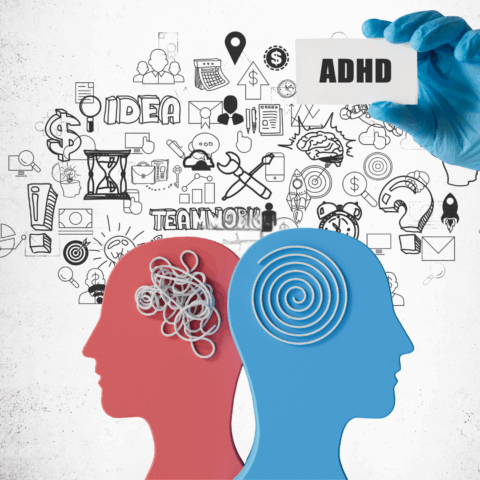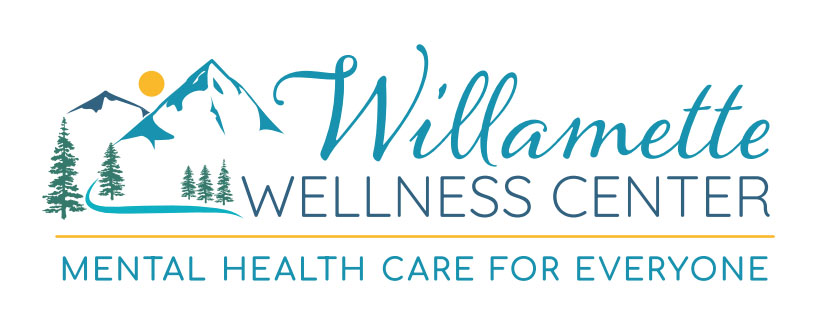Blog Post By Clarisse McLeod
Getting An ADHD Diagnosis: The Chaotic Journey to Clarity

When I start working with a client who comes in with ADHD, the best and worst part of the first session is how many of them can relate to how chaotic it can be to gain clarity about their symptoms. If it were possible to create a flow chart of my clients’ journeys over the years, I think it would resemble a web more than a tree.
For many, the process of receiving an ADHD diagnosis is anything but straightforward. From childhood to adulthood, misdiagnosis, masking, and missed opportunities often shape how clients see themselves.
ADHD in Childhood: Diagnosed, Missed, or Misunderstood
Often, we have clients who couldn’t concentrate, slow down their thoughts, stop daydreaming, or sit still when they were kids. Eventually, they got the diagnosis and treatment for ADHD…which is kind of hit or miss when it comes to helping self-doubt and anxiety about the ability to succeed.
Alternatively, their symptoms may not have been acknowledged, which can lead to the tendency to attribute their struggles to personal faults.
We also have clients who ran into teachers, parents, and professionals who wanted an easy solution to inconvenient behaviors and misdiagnosed the cause of their struggles as ADHD.
Not only would the treatment simply not work, but ADHD medication for someone who doesn’t have this condition can make daily functioning much more difficult.
These early years can shape a person’s beliefs about success, failure, and self-worth. An ADHD misdiagnosis or missed diagnosis may plant seeds of self-doubt that last into adulthood.
Adult ADHD: Coping, Masking, and Searching for Answers
And as adults, when clients start looking for answers or validation, suspecting that they might have had undiagnosed ADHD all their lives, the experience can be just as chaotic.
For adult clients who have made it this far in life without their ADHD being properly addressed, they’ve often engineered their lives around their symptoms in a way that works for them. It’s a double-edged sword because this can make recognition difficult, especially since the level of situational assistance these coping mechanisms can provide often ranges from unusual but effective to just less bad.
If the process of being diagnosed as an adult is straightforward and a client is lucky enough to find a practitioner who takes their concerns seriously, the emotional response can be unpredictable.
It can bring up feelings of validation for their hard work, despite an invisible struggle, or it can sometimes evoke a sense of grief for a quality of life they wish they could have sooner.
Alternatively, the message can feel like confirmation that there’s something wrong with them, especially if the blame from teachers or family members was unfair or if it has taken root as self-criticism.
This wide emotional range is common when seeking an adult ADHD diagnosis. For some, it offers relief and validation. For others, it stirs up grief, anger, or shame.
The Challenges of Getting an ADHD Diagnosis as an Adult
If the process of being diagnosed isn’t straightforward, it can require self-advocacy to get a professional to listen, especially if the client looks “successful” and has masked the symptoms of racing thoughts, inability to calm down, or difficulty concentrating, especially well. This can delay access to the support a client needs, especially if a clinician points to commonly overlapping symptoms with depression or anxiety as justification.
Also, many adult clients “put their finger on it” when they have children who act very much like they themselves did and subsequently receive the correct treatment. These parents often reevaluate struggles or characteristics in themselves that they may have previously thought were normal or a personal fault.
Or, the question may arise when hormonal changes and the aging process affect symptoms that were once manageable.
Dealing with this stage in life can be even more complicated because not only are these clients navigating changing bodies, but symptoms of ADHD that were controllable before now need more support.
An extra complication is that, especially for female clients, much of their life experience took place in a time when normal hormonal changes and neurodivergence were still treated with shame and judgment.
For women with ADHD, menopause and hormonal shifts can intensify symptoms. These challenges are layered on top of cultural messages that historically dismissed women’s struggles as “just hormones.”
The Strengths That Come with ADHD
Fortunately, as we’ve worked as a society to make neurodivergence more widely acknowledged and accepted, I’ve seen these clients able to identify unique strengths that often come along with the territory of ADHD.
For instance, many clients can cite their ability to remain calm in emergency situations, and creative problem-solving can be a valuable asset when navigating career paths.
Increasingly, I see clients sharing experiences of support and camaraderie alongside struggles and frustration.
Recognizing ADHD strengths is essential. Creativity, resilience, and calm problem-solving are often overlooked but invaluable traits for personal life and career.
Redefining the ADHD Journey
The experience of ADHD may always be chaotic…and perhaps, that isn’t necessarily a bad thing. At this point in my career as a counselor, it’s encouraging to witness the shift in how ADHD is viewed: not only is it no longer seen as a problem to be fixed, but it’s finally being recognized as an alternative and valuable way to navigate the world.
The ADHD journey may never look neat or orderly—but it can still be deeply meaningful, empowering, and worth embracing.
About the author
Clarisse McLeod, MFTA, believes the foundation of therapy begins with connection. With experience supporting adults, teens, and children, she helps clients navigate challenges such as ADHD, anxiety, depression, grief, and life transitions. She offers telehealth sessions in Oregon and Washington, and in-person appointments in Milwaukie, OR. Fill out the new client form to get started.

